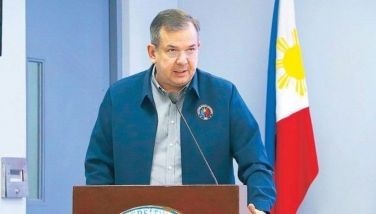FIBA eligibility rule under review?
MANILA, Philippines — SBP president Al Panlilio said recently the imbalance of competition in last month’s FIBA Asia U18 Championships where Australia and New Zealand figured in the final has opened discussion on whether FIBA could revisit its eligibility rule banning players with multiple citizenships to suit up for a country of their choice even if they were issued passports after turning 16 for as long as bloodline is established.
Panlilio pointed out that in the Asian Games which are supervised by the Olympic Council of Asia, the eligibility rules are different from FIBA. In the basketball competition of the Asian Games, a player may represent a country where he wasn’t born if he can show a passport that is three years old but each team is allowed only one naturalized import or a player with no bloodline. Among the naturalized imports in Asian Games rosters are Ricardo Ratliffe of South Korea, Doug Creighton of Chinese-Taipei, Jamarr Johnson of Indonesia and Tanguy Ngombo of Qatar.
In the Asian Games, the Philippines’ Stanley Pringle and Christian Standhardinger are considered locals but FIBA classifies them as naturalized imports because they were issued their Philippine passports after turning 16. The age rule was imposed by FIBA to curb the incidence of foreigners claiming to be locals because of liberal citizenship laws in certain countries. At the 2011 FIBA Asia Cup in Wuhan, the axe fell on Qatar for trying to pass off five Africans as locals.
In 2010, FIBA lost a case before the Court of Arbitration for Sport (CAS) when Belize protested the ban on seven players of Belize heritage, born overseas, to represent the country because they received their Belize passports after turning 16. Writer Aaron Humes of Belize newspaper Amandala said Dr. Ulrich Haas of the CAS “ruled that the seven players were considered dual citizens under section 27 of the Constitution of Belize which offers the option of keeping Belizean citizenship (as) Belize argued that the players did not have to specifically do anything because they were already Belizeans.” Before the decision was announced, FIBA issued a directive barring future appeals to the CAS. “This move affects all future appeals on regulations in all FIBA member countries,” said Humes.
“I think FIBA Asia is concerned that with Oceania now competing in our region, Australia and New Zealand will dominate and play in every final,” said Panlilio. “I understand FIBA Asia is now assessing how to balance the competition. From the Philippine point of view, our position is to just allow us to play our dual citizens for as long as they can prove bloodline, regardless of when they were issued their Philippine passports. That would make Stanley and Christian eligible to play in FIBA tournaments as locals. It’s every Filipino’s human right to represent his country anywhere in the world. In the US, you’re an automatic US citizen if you’re born in the US. In the Philippines, you’re a Filipino citizen even if born abroad as long as one of your parents is Filipino at the time of your birth. To prove bloodline, we’re willing to have our Fil-foreign players undergo DNA testing. Perhaps, it’s time to review the FIBA rule on eligibility.”
There is speculation that with the FIBA rule, some countries are finding ways to skirt it, recruiting foreigners before they turn 16 and passing them off as locals. Another rule that may be restudied is the exception for a country to enlist more than one naturalized player as in Australia’s case where the Boomers suited up West Sudan’s Thon Maker and American Kevin Lisch together in the recent third window of the FIBA Asia/Pacific World Cup Qualifiers.
SBP special assistant to the president Ryan Gregorio said it’s his personal belief that Fil-foreigners, born outside the Philippines, must be given rights equal to natural-born citizens. “If that’s the position of the SBP, then it’s worth pushing,” he said. “I will strongly support it. Nothing to lose. We can always propose and build a strong case on that issue. But in the end, we must be gracious to accept whatever the decision of the FIBA Board is.”
Gregorio, a former PBA coach now a Meralco executive, was brought back to basketball as chief scout and assistant coach under head coach Yeng Guiao with the Philippine team at the Asian Games. He was appointed as special assistant by Panlilio last Aug. 23. “It has been my goal to help the SBP and with Mr. Panlilio at the helm, I am motivated to help execute his vision of a strong basketball federation,” said Gregorio. “My over 20 years of experience in Philippine basketball will come in handy to ensure the continued growth of the No. 1 sport in our country.”
- Latest
- Trending






























